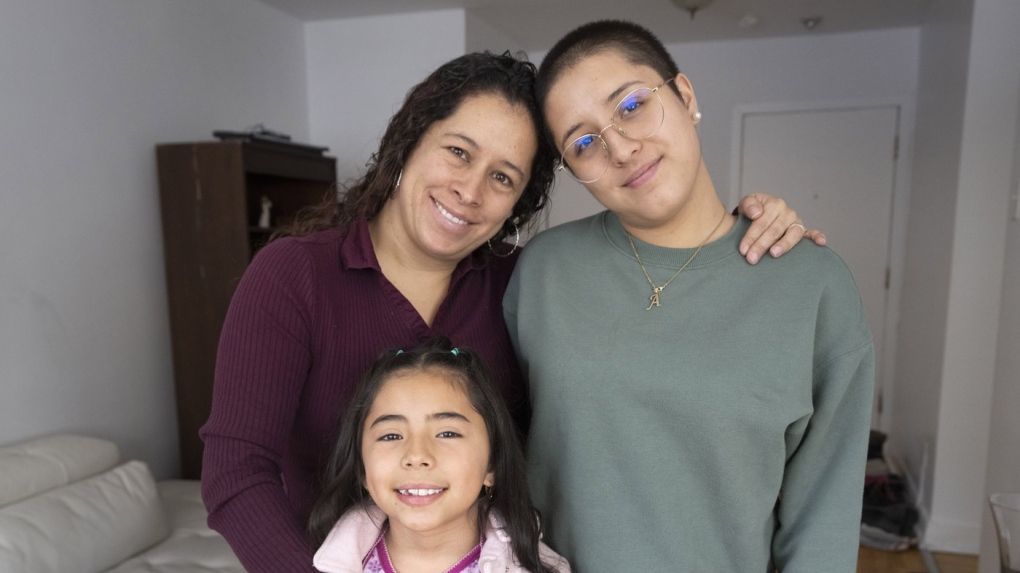
Pedro Fonseca, a 43-year-old asylum seeker from Colombia, says if he doesn’t start receiving social assistance from the Quebec government soon, he’ll likely become homeless.
He says he could ask family back home for a loan — but his relatives have little money.
“I am trying to be optimistic, but it’s very stressful,” Fonseca said in Spanish during a recent interview at his home in Montreal’s Rosemont-La-Petite-Patrie borough.
Fonseca, who crossed into Quebec from the United States in late November through Roxham Road — an irregular border crossing used by thousands of migrants a year — is down to his last few hundred dollars and living with a roommate in a modest, two-bedroom apartment. He pays $410 a month.
The asylum seeker can’t get a work permit until he is interviewed by the federal Immigration Department about his refugee claim; his appointment is in March 2024.
Fonseca is among the 39,171 asylum seekers who crossed into Quebec in 2022 through Roxham Road — an annual record.
He and other would-be refugees are putting pressure on Quebec’s social services and competing with residents for limited housing options.
Melissa Claisse, from the Montreal-based Welcome Collective, a local organization that assists refugee claimants, said asylum seekers face enormous difficulties finding apartments.
“It is magnified for this population because of their precarious immigration status,” Claisse said in a recent interview. “We have families who encounter a lot of scams. We try to warn families about these types of things.”
When asylum seekers arrive in Quebec, they are transported to hotels rented by the federal government, and after a short period, they are moved to government-run shelters.
If would-be refugees have money or are receiving Quebec social assistance, they have to find a place of their own.
Fonseca is a veteran of Colombia’s military, and he said he and his wife were threatened with violence because of his past as a soldier.
He said he arrived at a Montreal-area hotel on Nov. 29 and a few weeks later was moved to a shelter in downtown Montreal, while his wife and 15-year-old son remained back home in Floridablanca, about 400 kilometres northeast of the capital, Bogotá.
At the shelter, Fonseca was assigned to a room with three other men and told by officials he needed to find housing within seven days because he arrived in Canada with too much money — US$2,400. He said he filed his Quebec social assistance paperwork and is waiting for a reply.
In late-December, Fonseca moved into a one-bedroom apartment in Montreal with three other asylum seekers.
“Two of the men were sharing the bedroom, and the Venezuelan and I shared a mattress he found in the street that he placed in the living room,” Fonseca said. “There was no privacy.” He paid $380 for a one-month stay, including heating and internet.
Fonseca spent the next weeks on Facebook looking for an apartment.
On one occasion, he said he met a man who introduced himself as a landlord who knew people at Immigration Canada and who could help him find work under the table.
“He told me that I needed to be open-minded for this arrangement … and propositioned sex in exchange for a place to live,” Fonseca said.
Some asylum seekers, however, have been luckier than others in the search for housing.
Maria Fernanda Lopez, 43, also from Colombia, said her family had an easier time finding a home in Montreal compared to many other refugees they know. She said her husband’s fluency in French helped.
The couple arrived in Quebec through Roxham Road on Dec. 21 with their two daughters, Alejandra Ortiz, 19, and Sarah Cortes, 9, and stayed at a hotel on Montreal’s South Shore until they were able to find a two-bedroom apartment in Montreal. They moved in on Feb. 3; their rent is $1,160 a month.
“The fact that my husband speaks the language has helped us incredibly and opened many doors since our arrival. But we still faced many difficulties.” Lopez said.
She said the family felt pressure to find housing because they were told they could only stay at the government-subsidized hotel for three months.
Lopez said she and her husband wanted to avoid staying in a shelter because there was a chance their daughters wouldn’t be allowed to sleep in the same room with them.
The couple and their young daughter are getting $1,300 a month from the Quebec government; Ortiz receives $750.
“We were priced out of the majority of the places that we found,” Lopez said. “One apartment we visited had no heating, but because of our situation, we considered it. We experienced a lot of discrimination while visiting multiple apartments.”
Lopez said that when her husband would talk to the landlords or tenants over the phone, they were very friendly. But the moment they would meet in person, their demeanours would change and they would come up with excuses for not renting them the apartment.
“In one instance, the landlord told us outright that he did not rent to refugees,” Lopez said.
Lopez said her family found a place because they bonded with the tenant of the apartment they would eventually rent. The tenant is a teacher, like Lopez’s husband.
“As my husband told her about our journey, she decided to put in a good word for us (with the landlord) even though she had about 40 visits to go,” Lopez said.
“We were incredibly grateful; we got the apartment — but I think we are the exception. At the hotel, many people could not even eat because of the anxiety they felt having to find a place to live.”
